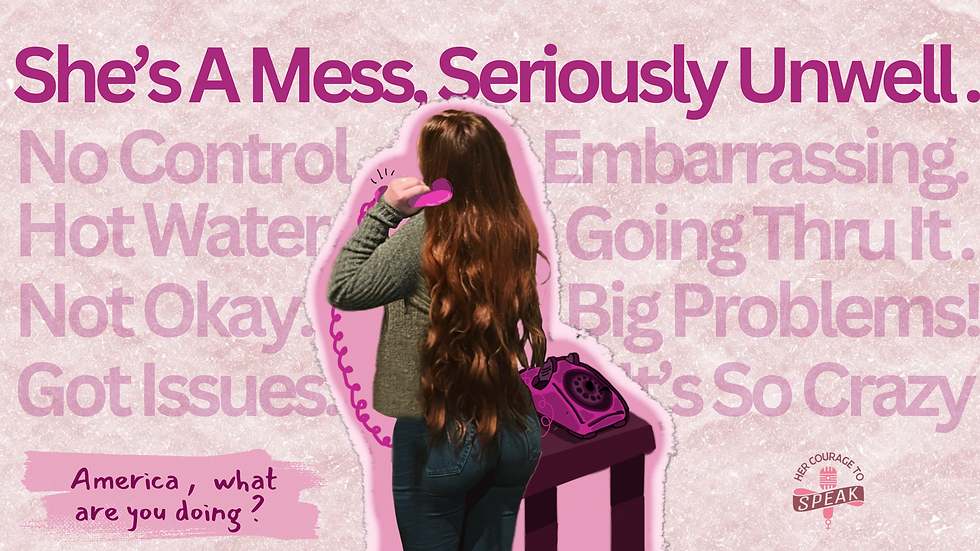Pregnant, Unmarried & Denied Care.
- Lexi McQueen

- Sep 15, 2025
- 4 min read
Lexi McQueen — September 15, 2025

The new series "She's A Mess, Seriously Unwell" addresses the recent news in the U.S. She (America) has big problems and needs to be called out! Follow along weekly to read about the hot water America continuously finds itself in.
What happens when beliefs become barriers to care?
In late July, a Tennessee woman was denied prenatal care for being unmarried. This week, the story is still raising urgent questions about what happens when personal beliefs are allowed to override medical care.
A 35-year-old woman in Jonesborough, Tennessee, walked into her doctor's office expecting what many would consider routine prenatal care. Instead, she was told she wouldn't be seen because she isn’t married. After citing their religious beliefs as justification, the doctor sent her away without care for her pregnancy.
To remind you, this isn’t just one doctor's personal choice; it’s backed by Tennessee’s new Medical Ethics Defense Act (MEDA) that went into effect this spring. Under this new act, healthcare providers, institutions, and even insurance can deny services that conflict with their “moral, ethical, or religious” beliefs. They are not even required to refer patients elsewhere.
Okay, so what does this mean in practice? In this case, a woman who's been with her partner for 15 years, raising a 13-year-old child together, is now driving out of state to Virginia just to see a doctor. Solely based on her marital status.
The Bigger Picture
Sure, seems like a small story in a small town… but this raises big questions.
Who decides who deserves care? Should a medical provider's personal values outweigh a patient's right to medical treatment?
Where does it stop? If being unmarried is grounds for denial, could someone else be turned away for being LGBTQ+, for using contraception, or for holding different beliefs?
What about the baby? Denying parental care not only impacts the mother, it puts maternal and infant health at risk.
The American Medical Association’s Code of Ethics is pretty clear. While physicians can choose who to accept as patients, they should never discriminate based on personal or social characteristics that have nothing to do with medical needs. Tennessee's MEDA gives cover for exactly that kind of discrimination.
The Human Cost
So… is she suing? No. Shouting for attention? No. She’s simply trying to protect her pregnancy. Now she has to travel to another state for something as basic as prenatal checkups.
In rural states like Tennessee, that burden is even heavier. Many patients don’t have the money, time, childcare, resources, or transportation to travel. Some will simply go without care. The consequences of missed prenatal appointments can be life-threatening.
If something does go wrong, then what? Increasingly, the blame is placed on women themselves. Across the country, we’ve already seen mothers investigated, charged, and even jailed for miscarriages or pregnancy outcomes outside of their control. In states where reproductive rights have been gutted, pregnancy itself becomes a legal risk. The woman who couldn’t get prenatal care because her doctor turned her away is suddenly the one on trial.
“It’s a different world now, and there’s a lot of discretion that prosecutors have, and some of them have agendas where they would like to make you an example.”
Tom Truman, Raleigh County Prosecuting Attorney, told CNN in an interview (2025).
Why It Matters
This isn’t just about Tennessee. More than a dozen states are considering (or have already) passed similar “conscience” laws for healthcare. On paper, they protect religious freedom. In reality, they open the door to cherry-picking patients based on moral judgment.
This is also a warning sign of where reproductive health is headed in the U.S. After the overturn of Roe v. Wade, states have more power than ever to restrict access… not just to abortion, but all kinds of reproductive care.
Here’s the irony… the same lawmakers who claim to be "pro-life” are now enabling doctors to deny care that supports life.
Where Do We Go From Here?
We need to ask, “Who is America protecting when laws like MEDA are passed? Patients.. Or provider ideologies?
If healthcare is about compassion, prevention, and life, then denying parental care because of marital status is not just unethical… It's dangerous!
For now, advocacy groups, ethicists, and patients themselves are pushing back. Some are filing complaints, others are calling for the law to be challenged in court. Many are sounding the alarm. If this can happen in Tennessee, it can happen anywhere.
America’s ethics are being questioned, and the first step to accountability is awareness. This isn’t just a Tennessee problem; it's a test case for how far “moral refusal” laws can go.
The question is… how long will we let personal beliefs stand between patients and the care they deserve?
References:
AMA Principles of Medical Ethics (2025) https://code-medical-ethics.ama-assn.org/principles
"Medical Ethics Defense Act" Bill Summary (2025, April 24). https://wapp.capitol.tn.gov/apps/BillInfo/Default.aspx?BillNumber=HB1044
Christensen, J. (2025, June 6). A West Virginia prosecutor is warning women that a miscarriage could lead to criminal charges. CNN Health. https://www.cnn.com/2025/06/06/health/miscarriage-criminal-charges
More articles, posts, and sources for more information on this story:
Aaron Parnas. (2025, July 25). TikTok. https://www.tiktok.com/t/ZP8SDDwxU/
Houghtaling, E. Q., (2024, July 22). Doctor Denies Woman Prenatal Care Because She’s Unmarried. The New Republic. https://newrepublic.com/post/198225/doctor-denies-pregnant-woman-prenatal-care-unmarried
Lee, C., (2025, July 28). A Woman Says She Was Denied Prenatal Care For Being Unmarried Under a New Tennessee Law. Here’s What to Know About It. Time. https://time.com/7306009/tennessee-prenatal-care-medical-ethics-defense-act/
Wells, R. (2025, July 20). Exclusive: Pregnant Woman in Tennessee Denied Care for Being Unmarried (Updated). TN REPRO NEWS. https://wellsrachelm.substack.com/p/pregnant-woman-in-tennessee-denied


Comments